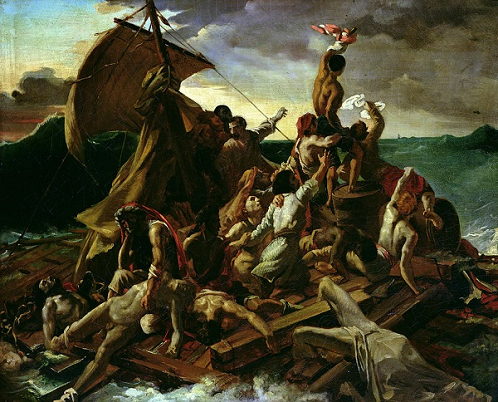More from the Forgiveness Chronicles
Wednesday, May 31st, 2017[ by Charles Cameron — picking up from Some recent words from the Forgiveness Chronicles ]
.
Once again, I am amazed at the sheer Christianity to be found in Coptic responses to utterly horrific persecution.
Fr Boules George (left) and Bishop Angaelos (right)
**
It was Bishop Angaelos, general bishop of the Orthodox Church in the United Kingdom, who delivered the remarkable sermon on forgiveness that I posted in my earlier report from the Forgiveness Chronicles..
It was also Angaelos who rebuked the Hungarian PM for saying refugee immigration should be limited to Christians:
Those arriving have been raised in another religion, and represent a radically different culture. Most of them are not Christians, but Muslims
Angaelos’ response:
As a Christian I could never justify a policy which only supported ‘our own’. The distinction should be based on people’s need, not their religion.
**
And here is Angaelos again:
Bishop Angaelos to the Terrorists: ‘You Are Loved’
By His Grace Bishop Angaelos on recent terrorist attacks in Egypt and elsewhereOnce again, we find ourselves experiencing pain before which words seem insufficient.
I have previously addressed victims of terrorist acts; I have addressed their families; I have even addressed those who may have had an opportunity, even in some small way, to advocate for or support those most vulnerable.
This time, however, I feel a need to address those who perpetrate these crimes.
You are loved. The violent and deadly crimes you perpetrate are abhorrent and detestable, but you are loved.
You are loved by God, your creator, for he created you in his image and according to his likeness, and placed you on this earth for much greater things, according to his plan for all humankind. You are loved by me and millions like me, not because of what you do, but what you are capable of as that wonderful creation of God, who has created us with a shared humanity. You are loved by me and millions like me because I, and we, believe in transformation.
Transformation is core to the Christian message, for throughout history we have seen many transformed from being those who persecuted Christ himself and Christians to those who went on to live with grace. We believe in transformation because, on a daily basis, we are personally transformed from a life of human weakness and sinfulness to a life of power and righteousness. We believe in transformation because the whole message of the cross and resurrection of our Lord Jesus Christ is to take humanity from the bonds of sin and death to a liberation in goodness and everlasting life. Our world is certainly suffering from the brokenness of our humanity, but it is our responsibility, personally and collectively, to encourage and inspire ourselves and all those whom we meet along our path to a life of virtue and holiness and the love and forgiveness of all.
This, of course, is far from the reaction that many may have expected, but the Christian message is just that: to look at our world as through the eyes of God, who loves all and who desires that all be liberated through him.
[ .. ]
What is increasingly obvious is that many of these attacks come about due to a loss of the meaning and comprehension of the sanctity of life, our own or that of others; so join me in praying for the brokenness of our world that causes parents to lose their children, children to lose their parents and humankind to lose the humanity for which it was created.
**
I have long been prepping a book about religious violence, and in particular the way in which it can be triggered and viewed as sanctioned by the words of scriptures which elsewhere encourage peace, to be titled Landmines in the Garden — the garden being Pardes, Paradise..
Now that the specifically eschatological element of ISIS has been laid out in detail by WIll McCants in his brilliant The ISIS Apocalypse, however, I have felt a shift in emphasis, and the book as I now perceive it will view religious violence — and indeed other violence such as that which drove Dylann Roof to his Charleston killings — through th specific lense of forgiveness and love, as exemplified by Bishop Angaelos, and for the matter, the members of the Charleston congregation who testified to their forgiveness of Roof at his trial.
**
To accompany Bishop Angaelos’ words, here’s a Coptic priest from Cairo, Fr. Boules George delivering a recent and no less remarkable sermon:
A Message to Those Who Kill Us
What will we say to them?
THANK YOU
The first thing we will say is “Thank you very, very much,” and you won’t believe us when we say it.
You know why we thank you? I’ll tell you. You won’t get it, but please believe us.
You gave us to die the same death as Christ–and this is the biggest honor we could have. Christ was crucified–and this is our faith. He died and was slaughtered–and this is our faith. You gave us, and you gave them to die.
We thank you because you shortened for us the journey. When someone is headed home to a particular city, he keeps looking at the time. “When will I get home? Are we there yet?” Can you imagine if in an instant he finds himself on a rocket ship straight to his destination? You shortened the journey! Thank you for shortening the journey.
We thank you because you gave to us to fulfill what Christ said to us: “Behold, I send you out as lambs among wolves” (Luke 10:3). We were lambs; our only weapons: our faith and the church we pray in. I carry no weapon in my hand. We are so grateful that you helped us fulfill this saying of Christ.





